To diagnose and choose a treatment tactic, you need to consult a gastroenterologist or proctologist. The main link in the treatment of inflammation of the large intestine is diet.
Causes
Colitis develops amid the negative effects of the following factors:
The mechanism for developing symptoms of inflammation of the large intestine is simple: as a result of the influence of a pathogenetic factor, entire groups of cells of the organ mucosa die, blood supply in this area increases, local edema, hyperemia and pain appear - the function of the colon is impaired.
Symptoms of inflammation
Symptoms of inflammation of the large intestine will be individual for each patient.
We list the main ones:
- abdominal pain;
- pain in the anus;
- mucous and mucopurulent discharge from the anus;
- traces of blood in the stool;
- low hemoglobin in the blood;
- constipation;
- diarrhea;
- flatulence;
- tenesmus - false urge to defecate;
- incontinence of gases and feces.
Pain in the abdomen is the primary symptom of inflammation of the colon. But few people pay attention to this symptom. Most people treat abdominal pain as ordinary spasms, and resort to taking an analgesic or antispasmodic.

Pain in the rectum or in the anus becomes the next symptom of inflammation of the colon. As a result of the inflammatory process on the intestinal mucosa, organ tissues begin to swell and react sharply to any passage of processed food residues through the colon.
Discharges of the mucous and mucopurulent nature are detected against the background of exacerbation. This condition is characterized by the appearance of ulcerative formations on the organ mucosa. After defecation in feces, traces of blood, mucus and pus can be considered. Any, even minor bleeding, may mean that the disease can trigger the development of hemorrhoids.
Anemia can be caused by significant blood loss in the colon. In this case, there is a violation of blood flow in the organs of the abdominal cavity, blood pressure sharply decreases, intoxication of the body develops.
Constipation and problems associated with bowel obstruction may be present continuously or alternate with diarrhea and fecal incontinence due to irritation of the affected colon tissue.
Flatulence is a related symptom of inflammation of the colon, which manifests itself against a background of bowel obstruction or constipation. At the same time, metabolic processes suffer, the intestine can not perform its main function - to process the remnants of food, this becomes the cause of increased gas formation.
Tenesmus is another symptom of inflammation of the colon, which means repeated but false urge to empty the intestines. Feces during tenesmus can be present in a very small volume or absent altogether.
Treatment
The treatment of symptoms of colon inflammation depends on the clinical picture of the disease and its neglect.
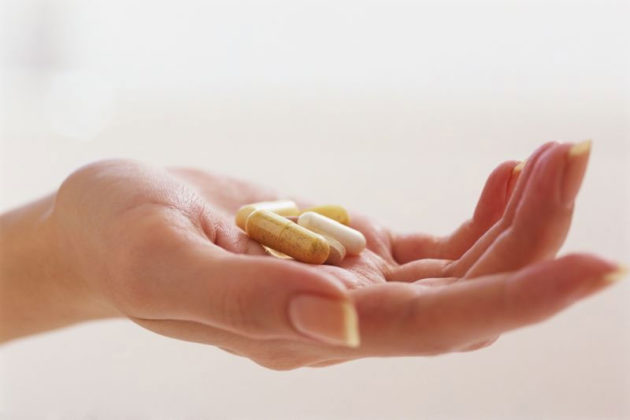
Traditional therapy includes the following groups of drugs:
- Antibiotics if the cause of colitis is of an infectious origin. The doctor can prescribe Levomycetin, Alpha Normix, Furazolidone, etc. The course of treatment and the dosage of the drug are selected individually.
- Anthelmintic drugs - Dekaris or Vermox. They are prescribed for the detection of helminthic invasion.
- Antispasmodics - Drotaverina hydrochloride, No-shpa, Papaverine. Antispasmodics can be given orally or as an injection.
- Sorbents - Enterosgel, activated carbon. Appointed in the presence of symptoms of intoxication, after poisoning.
- Antihistamines - Suprastin, Tavegil. Their use is indicated for the removal of edema of the colon wall and its relaxation.
- Enzyme preparations -,.
- Glucocorticosteroids - Cortonisol. It is used to treat symptoms of inflammation of the colon in a pinch.
- Antidiarrheal drugs - Loperamide, Imodium. Can eliminate the symptoms of colitis in uncomplicated cases.
- Multivitamins. Necessary to replenish lost vitamins and minerals as a result of diarrhea and intestinal dysfunction.
- Sedatives and antidepressants. Assigned in cases where colitis was caused by stress.
Treating symptoms of colon inflammation folk remedies You can start with the permission of the doctor, in parallel with the course of drug therapy.
A positive effect on the state of the intestines with colitis has a decoction of St. John's wort: 2 tbsp. l plants pour 200 ml of boiling water, leave for 6 hours in a thermos or under a lid. Take 1 tsp. 3 times a day.
A decoction of rose hips or dried fruits is also useful - you can drink in unlimited quantities throughout the day. The therapeutic effect is freshly squeezed beet juice, mixed in equal proportions with olive oil. You need to drink the resulting mixture in the morning on an empty stomach, after 30 minutes you can have breakfast.
You can use a decoction of chamomile, which has anti-inflammatory, antispasmodic and soothing effect on the digestive organs. One art. l dry chamomile inflorescences pour 200 ml of boiling water, leave for 1 hour in a sealed container and drink 1/3 cup throughout the day.

Prevention
In most cases, treatment for symptoms of colon inflammation is amenable to drug therapy. But experts believe that colitis is easier to prevent than treating it. And the main method of preventing this disease is a healthy diet or a balanced diet.
It is important to carefully consider the state of the digestive system, monitor weight. Everyone should know what can cause an inflammatory process in the intestines.
Any disturbance in the functioning of the organs of the gastrointestinal tract (constipation, diarrhea, flatulence, etc.) must be eliminated with the most gentle methods - moderate use of medicines or with the help of traditional medicine.
Diet for inflammation
The treatment of symptoms of inflammation of the colon and the treatment of other diseases of the digestive system always requires a diet. It is an integral part of therapy.
Since the mucous membrane of the colon is irritated during colitis, it is important not to irritate it even more, therefore, the goal of diet therapy is to minimize the burden on the organ, while maintaining the foundations of a balanced diet enriched with all necessary nutrients and microelements.
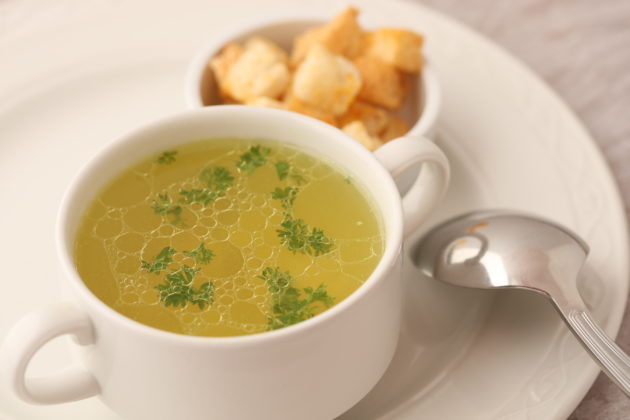
When colitis, the following product groups are prohibited:
- raw vegetables and fruits;
- marinades, salted and smoked dishes;
- bran, nuts, seeds;
- sour and sweet foods;
- fried food.
All food products that fall on the table to a person with colitis should undergo heat treatment by being stewed or steamed. Food should be soft, if possible wiped.
You need to eat at least 6 times a day, you can not overeat and starve. It is not recommended to use laxative and gas-forming foods, such as legumes, cabbage, milk, prunes and much more. Colitis requires compliance with the drinking regimen, since against the background of the disease, there is often a threat of dehydration.
Having decided on the tactics of treating symptoms of inflammation of the colon and diet, you can achieve a remission of the disease in a short time. It is important to adhere to the recommendations of the doctor, monitor your own health, observe preventive measures. Only a competent attitude to the disease will improve well-being and avoid its relapse!
Helpful video on the symptoms and treatment of colitis
The large intestine is the final part of the human digestive tract.
Its main objective is the absorption of processed foods and liquids.
Because of this, the colon is often exposed to various diseases. Consider in more detail the symptoms of inflammation of the colon or colitis, as well as methods of eliminating this ailment.
Causes of Colon Inflammation
The main reason for the development of colitis is considered a violation of its functions that occur in the intestinal mucosa. This is usually observed with a recent severe bacterial infection or after poisoning. In addition, the following factors can cause colitis:
1. The presence of chronic infections in the gastrointestinal tract, which from time to time worsen, causing complications in the form of colitis.
2. Helminth infection of the intestine.
3. The hereditary predisposition of a person to inflammation of the colon.
4. Progressive colon cancer and other oncological pathologies of the digestive tract.
5. Smoking.
6. Frequent intake of alcohol-containing drinks.
7. Nervous or physical exhaustion.
8. Weakened immunity.
9. Long-term treatment with antibiotics and other “hard” drugs for the body.
10. Stagnation in the pelvis.
11. Severe blood circulation in the intestines.
12. Improper human nutrition (frequent overeating, eating junk food, dry food, etc.).
In the presence of the above predisposing factors to this disease, the defenses of the human body are depleted, making it more vulnerable to inflammatory processes in the intestine. At the same time, quite often, colitis for a long time is asymptomatic, only occasionally causing outbreaks of pain or diarrhea.
At the same time, it is important to know that it is necessary to detect colitis as early as possible, before he has already managed to go into a chronic form, otherwise the person’s condition will deteriorate much and the treatment will be longer.
Symptoms and types of inflammation of the colon
Acute inflammation of the colon has the following symptoms:
1. Abdominal pain, which can occur after an act of defecation, physical activity, or simply in a calm state of a person. The nature of the pain is strong, cramping, cutting and oppressive. Localization of the symptom - lower abdomen, back, lower back and anus.
Often pain syndrome with colitis is permanent. It is especially clearly observed in the presence of additional gastrointestinal diseases in the patient (anal fissure, hemorrhoidal nodes, paraproctitis, etc.).
In some cases, the pains are so severe that a person already has difficulty suffering them. In this case, he urgently needs to prescribe potent analgesics.
2. The appearance of mucous secretions from the anus can be observed both after defecation, and simply when walking.
3. Bloody discharge from the anus may be after defecation. This will indicate an advanced stage of colitis.
4. Anemia develops with chronic bleeding. This is usually observed with the development of bowel cancer.
5. Constipation is also a frequent companion of colitis. In this condition, a person may not conduct bowel movements for up to several weeks. This symptom is considered one of the most important in diseases of the colon. Constipation is explained by a violation of patency of the large intestine and a malfunction in its work.
6. Bloating can be observed both with constipation and with normal stool. Often it develops against a background of flatulence. Such a symptom is associated with taking antibiotics that disrupt the intestinal microflora. Also, bloating can be observed with dysbiosis, which provoked inflammation of the intestine.
7. Intestinal upset (diarrhea).
8. An increase in body temperature is observed with infectious colitis.
9. Weakness and headaches.
10. Loss of appetite.
11. The appearance of tenesmus (frequent false urge to defecate). They develop due to a reflex spasm of the distal colon.
The chronic form of colitis has a less acute course. All symptoms are not so pronounced. In this condition, the patient will observe the following manifestations:
1. Changes in the clinical indicators of blood (increased red blood cells, increased white blood cells as the first sign of inflammation).
2. Chronic abdominal pain and after the act of defecation.
3. A frequent variable combination of constipation and diarrhea (irritable bowel syndrome with colitis).
4. Observation of pain in the abdomen without a clear localization.
5. Intensified gas formation.
6. The appearance of feces with a strong unpleasant odor.
7. General deterioration in the patient’s well-being. In chronic colitis, a person becomes lethargic, lethargic and exhausted. Other chronic gastrointestinal diseases may aggravate in him, neurosis and headaches often occur.
According to its physiology, colitis is the universal name for several diseases of the colon, each of which may be accompanied by its own symptoms.
These types of colitis are distinguished:
1. Ulcerative colitis (non-specific form). Usually it occurs in people with a hereditary predisposition to this pathology or due to the effect of the stimulus on the intestine. According to statistics, ulcerative colitis is most often detected in people with an age of twenty to forty years.
Ulcerative colitis has the following symptoms:
Severe constipation;
Discomfort in the joints;
Heavy bleeding from the rectum;
Purulent discharge from the rectum;
The exhaustion of the body.
The main danger of this form of colitis is considered to be an increased risk to the formation of cancer pathologies and intestinal perforation.
2. The spastic form of colitis is due to bowel spasms. In this condition, a person can feel pain, bloating and difficulty with bowel movements. In most cases, such colitis provokes stress and severe nervous strain. He is treated quite quickly.
3. The pseudomembranous form of colitis develops due to the entry of pathogens into the intestines. Symptoms of such inflammation of the colon will be:
Nausea;
Severe diarrhea with watery stools and an admixture of mucus;
Weakness and chills;
Frequent urination;
Fever;
Tachycardia;
Drop in blood pressure;
Metabolic disease;
Dizziness.
4. Enterocolitis is accompanied by severe damage to the mucous layer of the colon. It develops after infection in it. Enterocolitis has the following symptoms:
Bloating;
The formation of white plaque in the language;
Fever;
Abdominal cramps.
Colon inflammation: diagnosis and treatment
When the first signs of colitis appear, you should consult a doctor (gastroenterologist or proctologist) as soon as possible. After the first examination and palpation of the abdomen, the doctor will prescribe the following mandatory diagnostic procedures:
1. General blood test.
2. General urine analysis.
3. Advanced biochemical blood test.
4. Analysis for sugar level.
5. Ultrasound of the abdominal cavity.
Treatment of inflammation of the colon is selected depending on the type of colitis, symptoms and degree of neglect. Traditional drug therapy involves the appointment of such groups of drugs:
1. Antibiotics are used for viruses and infections. The duration of their administration and the dose is selected for each patient individually.
2. Antiviral drugs.
4. Antispasmodics (No-shpa) are used to relieve spasms. In this case, the drug can be taken in tablet form or administered as an injection. Also, from spasms, rectal suppositories can be used.
5. In case of poisoning, sorbents (Enterosgel) are prescribed.
6. Antihistamines are used to relax the intestinal wall (Bacromat).
7. With abundant diarrhea, intravenous administration of sodium chloride is prescribed to avoid dehydration.
8. Enzymes are needed to restore intestinal function (Festal, Mezim, Pancreatin).
9. Sedatives and antidepressants are used when colitis has caused stress.
10. In advanced cases, glucocorticosteroids are prescribed.
In addition to drug therapy, the patient must follow a diet (table No. 4). It provides for a complete rejection of fatty, starchy, salty, smoked and sour. Food should be well cooked and ground.
Intolerable pain in the abdomen, unstable stool with impurities of mucus, and sometimes blood to excrement, high fever - all these are symptoms of inflammation of the colon. The disease lasts for several days, and sometimes several weeks.
Inflammation of the large intestine is accompanied by a false urge to defecate, when the patient thinks he wants to go to the toilet, but the fact of defecation does not occur. Constipation is often combined with diarrhea. As a result, the number of bowel movements can reach up to 10 -15 times a day.
Also, with inflammation, the general state of health is disturbed. Patients are characterized by reduced vitality. Severe weakness, lethargy, fatigue, outbreaks of irritability, sleep disturbances - this is an incomplete list of symptoms of the disease.
What threatens untreated colitis? If acute inflammation of the colon cannot be cured, the next step will have to treat chronic colitis.
How to determine inflammation of the colon yourself?
However, with various forms of the disease there are also differences.
So with ulcerative inflammation of the colon ulcers form on the walls of the mucosa, pain occurs during contractions. Bleeding occurs.
At spastic inflammation of the colonfeces comes out in the form of dense lumps.
Concerning duodenal inflammation, then basically the symptoms of the disease are almost the same. Pain in such cases appears after eating for 2 hours.
Research methods are aimed at studying the intestinal absorption capacity. In laboratory conditions, an endoscopy of the intestine is performed. Blood and feces are taken, which reveal signs of anemia and diagnose the degree of dysbiosis.
Signs of different forms of inflammation of the colon
Colon inflammation is different. Here is some of them.
- Inflammation of the duodenum.
- The inflammatory process is thick and small intestine.
- Inflammation of the rectum.
One of the most common diseases is inflammation of the colon or colitis as it is also called.
At present, 4 types of colon inflammation are shared:
Acute form.
Chronic form.
Colonic ulcerative inflammation.
Spastic form of inflammation.
The disease is characterized by periods of exacerbation and relapse. During periods of remission, a person feels quite healthy. Only an increased nervousness of the patient and frequent constipation can remind of the existing inflammation of the intestine.
Symptoms of acute intestinal inflammation
Acute inflammation of the intestine can occur from several days to several weeks. It can go into a chronic form for a number of reasons, among which are improper and irregular nutrition, allergies, and the effects of drugs. If acute colitis is not treated, then, having taken a chronic form, it will not bother the patient for some time, but under the influence of adverse factors, the disease recurs.
Acute colitis, most often has an infectious origin, and much less often acute inflammation occurs with intoxication of the body. Acute inflammation of the bowel symptoms has the following:
Painful abdominal cramps.
Frequent loose stools with mucus or blood.
Nausea, vomiting.
Temperature rise;
Deterioration of the patient’s well-being.
A general blood test for intestinal inflammation will record a high erythrocyte sedimentation rate (ESR) and the presence of a large number of white blood cells, which indicates the presence of an inflammatory process in the human body.
Signs of the disease with chronic inflammation of the colon
Depending on the causes of chronic disease of the colon, partial or complete damage to its surface is possible. The occurrence of inflammation is promoted by irregular eating and an inadequate diet. Untreated acute colitis can turn into a chronic form, and then the patient will have to put up with this disease for many years. Chronic inflammation of the intestine has the same symptoms as acute colitis, but for the chronic form of the disease is characteristic:
Lack of appetite in the patient.
Rapid weight loss.
Some varieties of this serious illness do not occur with diarrhea, but are accompanied by constipation. Also, in rare cases, chronic colitis can adversely affect the immune system.
Patients complain of periodic pain in the abdomen, which are cramping in nature. These pains subside only after the act of defecation. Among the main symptoms of the chronic form of the disease are bloating and rumbling of the intestines. Symptoms such as nausea, bitterness in the mouth, belching are also common with this disease.
Chronic colitis affects the central nervous system, so symptoms of intestinal inflammation such as sleep disturbance, nervousness, decreased performance are permanent.
Colon inflammation: treatment for the disease
Why is it that when we get some disease, we don’t try to immediately seek help. Often you hear from acquaintances: “Yes, everything is fine, it will pass by itself, or I’ll come home, drink an anesthetic and everything will be fine.” However, often we do not think about the fact that inflammation of the colon can be a very serious disease, and in this case you cannot get rid of one pill. It is precisely from our carelessness that the irreversible and sometimes deplorable consequences then come which can no longer be corrected.
To diagnose the disease, you must consult your doctor. As a rule, inflammation of the colon is treated by fasting for two to three days. Antispastic painkillers relieve abdominal pain. A warming warmer or compress also helps with the treatment. If necessary, the doctor may prescribe other drugs to treat inflammation.
With more complex and advanced forms, surgical treatment of inflammation of the colon is possible. Therefore, you should remember a simple rule - never start a disease, seek help in time and do not self-medicate.
Treatments for colon inflammation
In order to eliminate the causes that led to the symptoms of the disease, a set of measures is prescribed, among which:
Mandatory dieting. Only boiled food and lack of fiber-rich foods (raw vegetables, fruits and rye bread).
Taking enzyme preparations that improve the digestion process (for example, Festal, Pancreatin and others).
Home use microclyster with olive, sea buckthorn oils.
Physiotherapy, massage, therapeutic exercises in the treatment of inflammation of the colon.
Sanatorium treatment of inflammation of the colon.
Relieving an attack of chronic intestinal inflammation
If an attack occurs, the patient is prescribed a bed rest for at least a week, and the necessary medications are prescribed by the doctor. Most often, intestinal inflammation is treated at home. Only with a complex course of the disease, which can cause severe bleeding, abscesses and serious intestinal problems that threaten the patient with peritonitis, he is hospitalized and undergoes surgery.
Chronic inflammation of the intestine should be regularly monitored using technical means, as it can lead to cancer.
On the first day of the disease, it is better to completely refuse food, but you should drink a lot, at least a glass per hour of warm water, or unsweetened, weak tea. This is done in order to avoid dehydration, because vomiting and diarrhea lead to large losses of moisture.
On the second day with inflammation of the intestine, you can treat yourself to any sour-milk products, and porridges boiled in water. It is not recommended to use millet and pearl barley.
The menu of the third and fourth day is replenished with low-fat soups, steamed omelettes, soft-boiled egg, and jelly from blueberries, cornel or viburnum.
Home treatment for inflammation of the colon
Knowing your diagnosis, treatment can be carried out with folk remedies:
It helps well with inflammation occurring with diarrhea, the rhizome of the coil, because it has a strong astringent property. To prepare the medicine, 200 g of raw material must be filled with cold water, and insisted for 1 hour at room temperature, then boiled for five minutes. Cool the broth, strain and take a quarter cup in the morning and evening;
A positive effect of honey has been noted if it is used in the treatment of chronic intestinal inflammation, which is accompanied by diarrhea. In one glass of cold water, dissolve 1 tbsp. a spoonful of honey and a drink. It is recommended to do this before meals, three times a day.
The rules of nutrition for inflammation in the colon
At home, special attention should be paid to food. Colitis greatly depletes the body, so nutrition should be abundant on the one hand and sparing on the other, in order to regulate bowel movement. Diet in the treatment of inflammation of the colon excludes the consumption of meat and eggs. Doctors recommend consuming large quantities of dairy products, easily digestible cereals (for example, oatmeal), boiled vegetables with butter.
It is necessary to exclude from the food all poorly digested products (cheese, meat, beans, eggs).
to treat inflammation of the colon, exclude the use of bread.
Stop drinking alcohol, sweets and soda.
All food should be finely chopped or wiped on a grater.
Spicy seasonings are also harmful in inflammation of the small and large intestines.
Eat more cereals, potatoes, drink milk.
Do not be afraid to go to the hospital, as only a doctor can determine inflammation of the colon and prescribe all the procedures for eliminating the disease. Never forget to take drugs on time and eat properly. After all, if you stop everything for at least one day, then all your attempts to recover will be in vain, and again you will need to start all over again. And this is an extra waste of money, again nervous tension and new attacks in the abdomen.
Causes and prevention of colitis
Most often, the causes of inflammation of the colon are transferred infectious diseases, poor nutrition, intoxication caused by drugs, poisoning with chemicals. Stressful situations can also negatively affect the colon.
Intestinal bacteria or viruses enter the human body through the oral cavity and begin their harmful activity. The body is increasingly difficult to cope with adverse factors and inflammation of the colon progresses.
Causes of chronic inflammatory processes of the colon
How to prevent colon inflammation?
A healthy lifestyle is needed to prevent inflammation:
enough sleep
and quality food.
An attack of inflammation can be triggered by inaccuracies in food and stress. Therefore, in order to prevent relapse, you need to eat regularly and properly, and learn to control the manifestation of your emotions. Between exacerbations, sports will also be beneficial.
From childhood, try to take care of your health, protect your colon and eat only healthy food. Then you will not need to resort to the help of doctors.
The main cause of colitis is a functional or morphological change that has occurred in the intestinal mucosa. As a rule, the lesion appears as a result of bacterial dysentery, helminthic invasion, severe poisoning, the constant presence of foci of chronic infection in the digestive tract.

Against the background of disposing factors, when for one reason or another the protective functions of the intestine are reduced, the action of the pathogen leads to damage to the mucous cells lining the walls of the colon from the inside. A focus of inflammation develops, which at first may exist asymptomatically.
If acute colitis occurs for a long time with an erased clinical picture, inflammation can go into the chronic stage. It is important to promptly identify the primary disease, paying attention even to minor signs of pathology. Acute colitis responds well to treatment, but in the absence of adequate therapy and chronicity of the process, the disease becomes long and painful.
Acute colitis can occur violently, with pronounced general and local symptoms:
- bloating;
- pain
- secretion of mucus from the anus;
- purulent-blood impurities in the feces;
- frequent painful urge to defecate;
- diarrhea.
These manifestations are often accompanied by general malaise, vomiting, fever, weakness, weight loss. Such pronounced signs make the patient consult a doctor and conduct timely diagnosis.
Examination of the colon reveals:
- swelling of the mucosa;
- thickening and hyperemia of the walls of the affected area of \u200b\u200bthe intestine;
- secretion of a large amount of mucus, and sometimes - purulent discharge;
- erosion and ulceration of the mucous layer;
- minor hemorrhages.
A clinical blood test shows elevated ESR and white blood cells.
 Another picture of the disease is also possible. For several weeks, the patient may experience problems with loose stools, drilling and abdominal discomfort and other local symptoms. But, since they are insignificant, the patient for a long time does not attach importance to them and does not associate them with a serious inflammatory process. During the latent period, colitis becomes chronic.
Another picture of the disease is also possible. For several weeks, the patient may experience problems with loose stools, drilling and abdominal discomfort and other local symptoms. But, since they are insignificant, the patient for a long time does not attach importance to them and does not associate them with a serious inflammatory process. During the latent period, colitis becomes chronic.
Signs of chronic colon inflammation
Chronic colitis, in addition to inflammation of the mucous membrane, acquires other unpleasant manifestations. Changes occur in the walls of the intestines themselves: they are shortened, there is a narrowing of the lumen in the affected area. The blood supply to the diseased area is disturbed, superficial ulcers become deeper and go into the thickness of the muscle layer of the intestine, suppuration develops, neoplasms - pseudo-polyps may appear.
A blood test gives an obvious picture of inflammation (pronounced leukocytosis), a large amount of leukocyte mucus is also determined in the feces. The results of the coprogram show the presence of pathogenic flora, red blood cells.
The patient notes the following symptoms:
- problems with stool: constipation, their alternate combination;
- pain throughout the abdomen without specific localization;
- frequent unproductive urge to the toilet with the release of mucus with streaks of blood instead of feces;
- increased gas formation and constant bloating;
- fetid stool.
The general well-being of the patient can be both quite satisfactory and extremely uncomfortable. The torment with the stomach is aggravated by nausea, belching, lack of appetite, and a bitter aftertaste in the mouth. Against the background of weakness and malaise, working capacity decreases, irritability and nervousness appear.
Types of disease
Colitis is the common name for inflammatory diseases of the large intestine, which includes a number of separate diagnoses. Colitis is divided into types depending on the cause and specific manifestations of a particular pathology.
 One type of chronic inflammation of the colon. The etiology of this disease is not fully understood. It is associated with a defect in the immune system, as a result of which stimuli, which normally do not cause any reaction in a healthy body, provoke severe inflammation in a patient with ulcerative colitis. One of the hypotheses of the origin of the disease is a genetic predisposition.
One type of chronic inflammation of the colon. The etiology of this disease is not fully understood. It is associated with a defect in the immune system, as a result of which stimuli, which normally do not cause any reaction in a healthy body, provoke severe inflammation in a patient with ulcerative colitis. One of the hypotheses of the origin of the disease is a genetic predisposition.
According to statistics, this pathology is more often diagnosed in young women from 20 to 40 years old, mainly in urban residents, which indirectly indicates the impact on the pathogenesis of the environmental factor and lifestyle.
Nonspecific ulcerative colitis is expressed in hemorrhagic inflammation of the colon with the following manifestations:
- severe pain, more often in the left half of the abdomen;
- low-grade fever;
- discomfort in the joints;
- rectal bleeding;
- discharge of blood and pus from the anus.
Over time, these symptoms become less pronounced, forming a state of remission, but with an exacerbation of the disease, the patient's condition becomes severe. He is tormented by pain, diarrhea, anemia, physical exhaustion develops due to blood loss.
Nonspecific ulcerative colitis is extremely dangerous for its complications:
- the formation of intestinal expansion;
- the occurrence of internal bleeding;
- the possibility of perforation of the walls of the intestine;
- risk of peritonitis;
- the formation of conditions for the development of oncology.
Spastic inflammation of the large intestine
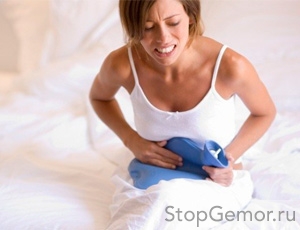 By the name of this pathology, it is logical to assume that it is based on intestinal cramps. And this is indeed so: contractions of the intestinal walls of different strength and frequency lead to unpleasant symptoms in the patient:
By the name of this pathology, it is logical to assume that it is based on intestinal cramps. And this is indeed so: contractions of the intestinal walls of different strength and frequency lead to unpleasant symptoms in the patient:
- bloating;
- constipation
- difficulty in defecation;
- diarrhea
- pains.
Spastic colitis refers to functional disorders, that is, in fact, is not a serious pathology. The reason for it lies in the psychological and neurological planes. Involuntary cramps most often occur against the background of stress, chronic fatigue, physical and nervous strain, experienced shock. This disease is treated with relaxation of the smooth muscles of the intestines, and most importantly - with restorative and sedative agents.
Pseudomembranous colitis
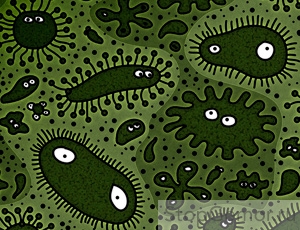 Pseudomembranous inflammation is the result of intestinal dysbiosis with uncontrolled reproduction of opportunistic microorganisms.
Pseudomembranous inflammation is the result of intestinal dysbiosis with uncontrolled reproduction of opportunistic microorganisms.
This form of colitis develops while taking antibiotics that upset the intestinal microflora in favor of potentially dangerous microbes.
Symptoms accompanying pseudomembranous colitis:
- Diarrhea that appeared during antibiotic therapy, especially when treated with tetracycline drugs. If a few days after the end of the course, normal stool is restored, a diagnosis of mild colitis is made.
- Moderate inflammation is characterized by persistent diarrhea after discontinuation of antibacterial drugs. The stool is watery, with mucus and blood. Abdominal pain, worse at the time of bowel movement. Frequent urination to the toilet, including false, is noted when bowel movement does not occur. Signs of intoxication appear and increase: temperature, chills, weakness, nausea.
- Severe pseudomembranous colitis is a critical condition in which serious complications in the form of impaired cardiac activity (tachycardia, pressure drop), development of electrolyte imbalance, failure of metabolic processes join in intoxication of the body and local symptoms.
Enterocolitis
Enterocolitis is a disease that combines the inflammatory process in the large intestine with damage to the gastric mucosa. Acute enterocolitis occurs in response to an infection or a non-infectious effect: allergens, chemicals, poisons, food poisoning. Primary inflammation develops suddenly:
- spasmodic abdominal pain;
- bloating and rumbling;
- nausea, vomiting is possible;
- severe diarrhea.
If enterocolitis is of an infectious origin, blood and mucous impurities in the stool, fever, intoxication, join dyspepsia. When feeling the abdomen, foci of pain are determined, a profuse plaque falls out on the tongue.

- Symptomatic - pain relief with antispasmodics.
- Reducing the load on the digestive tract - liquid diet for 2 to 3 days.
- In case of poisoning, it is necessary to rinse the stomach.
- To avoid dehydration with severe diarrhea and vomiting - control the flow of fluid into the body, taking Regidron.
- If an intestinal infection is detected - antibiotic therapy.
- Intoxication is eliminated with the help of detoxification treatment.
Untreated inflammation can transform into a chronic disease. In this case, a superficial lesion of the mucous membranes develops further and penetrates deep into the walls of the intestine and into the submucous layer of the stomach. The course of the disease - with periods of exacerbations and remissions, over time, persistent violations of intestinal function form.
Colon ischemia
Ischemic colitis is a form of intestinal inflammation caused by a disturbed blood supply to the colon. Damage can occur in any area, but more often it is an area of \u200b\u200bsplenic curvature, less often the sigmoid colon, descending or transverse colon, becomes inflamed.
Weak blood circulation leads to limited nutrition of the intestinal walls, resulting in foci of ischemia. Symptoms of this condition: episodic epigastric pain that occurs after eating, diarrhea and bloating after meals, sometimes vomiting. Over time, weight loss is observed.
In acute violation of the blood supply associated with blockage of blood vessels, necrotic processes occur, which are expressed:
- sharp pain with localization in the left abdomen;
- signs of bowel obstruction;
- bleeding from the anus;
- the development of peritonitis.
Treatment of inflammation of the large intestine (lower section)
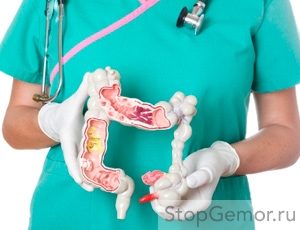 The treatment for colitis depends on the specific diagnosis and the severity of the symptoms. If mild inflammation caused by poisoning can pass in a few days as a result of gastric lavage, sorbent intake, heavy drinking and diet, then more serious illnesses require a longer and more serious approach, often in a hospital setting.
The treatment for colitis depends on the specific diagnosis and the severity of the symptoms. If mild inflammation caused by poisoning can pass in a few days as a result of gastric lavage, sorbent intake, heavy drinking and diet, then more serious illnesses require a longer and more serious approach, often in a hospital setting.
Lack of proper treatment can lead to dangerous complications: bowel obstruction, peritonitis, liver abscess. In order to avoid unpleasant consequences when signs of inflammation of the colon occur, you should consult a specialist - proctologist or gastroenterologist. Especially need to hurry if the symptoms arose against the background infectious disease or immediately after it, as a result of food, chemical poisoning, medication.
Diet for colitis
With any form of colitis, a strict therapeutic diet is indicated. More often, patients begin to observe it on their own, intuitively unloading the gastrointestinal tract. The doctor prescribes table number 4, which excludes products that provoke fermentation and rot in the intestine. Eating with colitis implies refusing food that irritates the mucous membranes: spicy, salty, fatty, fried foods, acidic foods, spices, milk.
Vegetables, fruits, berries, sweets are temporarily prohibited. Food should be liquid or semi-liquid, mashed, of a comfortable temperature - neither hot nor cold. A sparing regimen should be adhered to throughout the treatment and for some time after it. At the beginning of the disease, it is better to completely abandon food for a couple of days and limit yourself to heavy drinking.
Healing enemas
Colitis enemas are done only as prescribed by the doctor, if necessary, flush the intestines from infectious agents and contents, direct delivery of therapeutic substances to the mucous membrane.
- Antiseptic enemas with infusion of chamomile, calendula, collargol help relieve swelling and hyperemia, soothe the mucous membrane, and destroy the pathological microflora at the local level.
- The introduction of sea buckthorn oil into the colon promotes the healing and restoration of the mucous membrane.
Traffic
 With intestinal inflammation, prolonged sitting is contraindicated. The lack of movement provokes stagnation in the colon, leads to poor blood supply to the walls, poor peristalsis, causing constipation and intoxication with fecal masses.
With intestinal inflammation, prolonged sitting is contraindicated. The lack of movement provokes stagnation in the colon, leads to poor blood supply to the walls, poor peristalsis, causing constipation and intoxication with fecal masses.
To intensify the work of the intestine and restore blood circulation, feasible physical exercise: walking, high rises of knees in a standing position, etc. Simple exercises can be done even with bed rest.
Drug therapy
Taking medications for colitis depends on its form and is prescribed only after clarifying the diagnosis and establishing its cause:
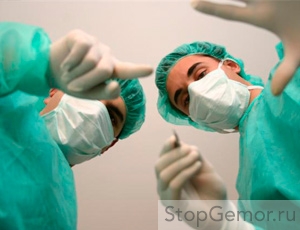 Surgical intervention for inflammation of the colon may be necessary for the development of complications (perforation, peritonitis), necrotic processes, obstruction of the lumen of the intestine, obstruction, the transition of infection to surrounding tissues.
Surgical intervention for inflammation of the colon may be necessary for the development of complications (perforation, peritonitis), necrotic processes, obstruction of the lumen of the intestine, obstruction, the transition of infection to surrounding tissues.
Sluggish colitis, which are not amenable to conservative therapy, serve as a permanent source of infection and a poor condition of the patient, it is also recommended to eliminate by surgery. Interventions often require ulcerative colitis.
Supportive care for chronic colitis
In the chronic course of proctitis without exacerbations, it is recommended to carry out general strengthening and preventive measures in sanatorium-resort conditions:
- mud procedures;
- radon baths;
- mineral water treatment;
- massotherapy;
- gymnastics;
- physiotherapy.
Treatment of inflammation of the large intestine requires a long and comprehensive approach to prevent relapse, in the acute form, the transition to the chronic stage. In no case should you take medicine on your own or ignore the symptoms of inflammation. If you have complaints that do not disappear within 2 to 3 days, you must consult a doctor.
In medical practice, this pathological condition is called colitis. To understand what causes the inflammatory process, and what are its signs, we will consider all the points of this deviation in more detail.
Causes of the disease
Inflammation of the colon, or rather colitis, can occur as a result of any infections, viruses, gross errors in nutrition, as well as as a result of the ingress of household and industrial poisons into the human body. In addition, the presented deviation quite often forms repeatedly, in the form of an independent disease that has an immune nature. By the way, often inflammation of the colon occurs as a result of any disturbances that have occurred in the small intestine or stomach. In any case, with such a pathology, you should definitely contact specialists for professional help.
Inflammation of the colon: symptoms, treatment of the disease
Most often, a disease such as colitis is accompanied by pain in the intestines. These signs are one of the leading symptoms of this deviation. Such a dangerous disease can affect not only a thick one, but also If the inflammatory process arose in both departments, the patient feels aching and unpleasant pain, which is usually localized on the sides of the abdominal cavity.
In medical practice, inflammation of the colon (the symptoms of such a disease may vary) are divided into four types:
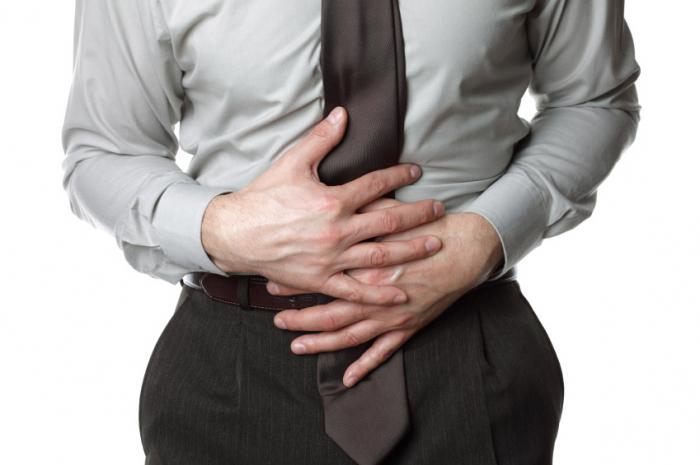
Consider each type of colitis in more detail.
Acute inflammation of the colon
The very first symptoms of this disease to any degree are:
- pain in the abdomen, head and muscles;
- nausea;
- bloating;
- loss of appetite;
- vomiting
In addition, unstable stools are characteristic of acute colitis: constipation can be replaced quickly by diarrhea. Also, impurities of blood and mucus appear in the feces of the patient. At the same time, a person can feel a significant loss of strength, malaise and lethargy, and in more severe cases, an increased body temperature and the formation of a white coating on the tongue are observed.
It is also worth noting that colitis is accompanied by frequent and painful urge to the toilet "for the most part."
Chronic disease and its symptoms
In the event that it is acute and, lasting several days, is not subjected to proper treatment, then it goes into the chronic stage. In this case, the patient may note less intense pain. However, they do not stop completely and disturb the patient for a rather long time.
If such an inflammatory process has turned into a chronic form, then a person can observe the following symptoms: 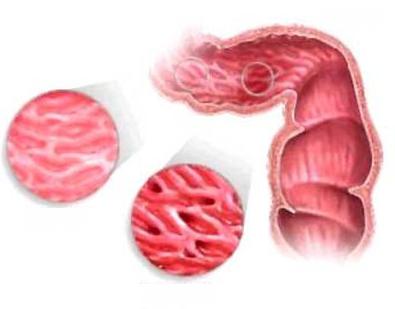
- cramping pains in the abdomen, especially in the direction of the colon;
- lack of appetite;
- nausea;
- general weakness;
- alternating constipation and diarrhea;
- bloating due to fermentation of food in the intestines;
- dyspeptic symptoms;
- weight loss.
In addition, with chronic inflammation, the patient may experience bursting and increased gas formation. In this case, the stool is most often liquid and regular (up to four times a day).
Symptoms of ulcerative colitis
Colitis (ulcerative) is an inflammation of the mucosa accompanied by the appearance of ulcers. The presented form of a disease of the gastrointestinal organ develops for a rather long time. In this case, the patient may experience periods of remission and exacerbation. One of the first signs of such a deviation is cramping pain in the lower abdomen. After a certain period, the patient may experience bleeding during bowel movements. Blood during a trip to the toilet is usually allocated in an amount of up to 300 ml. If a person has a period of exacerbation, then it can go in a stream, as a result of which the patient's blood pressure is significantly reduced.
In addition, with ulcerative colitis, colon enlargement, the occurrence of perforation and the development of peritonitis are possible. Only an experienced specialist can determine the severity of the disease and detect ulcers on the mucous membrane during an examination of this organ (with a procedure such as sigmoidoscopy). 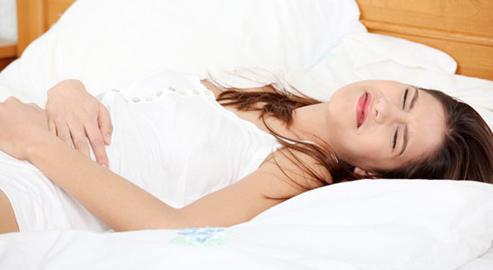
Signs of Spastic Colitis
With this form of bowel disease, the feces in a patient may look like fairly dense lumps (sheep feces). To exclude this deviation, the patient is recommended to take tests for a laboratory test, as well as undergo x-ray and sigmoidoscopy procedures.
How to treat an inflammatory disease of the large or small intestine?
In the event that you experience pain or noticed any unusual symptoms, you should immediately undergo an examination. But first, you need to seek the advice of such a specialist as a gastroenterologist. After all, only he can diagnose you with "inflammation of the colon." The treatment of this disease at any stage of development primarily involves the observance of a special diet. After all, it is proper and healthy nutrition that is the key to a speedy recovery. 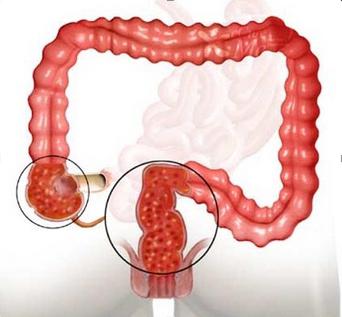
In addition to pills, you can get rid of such a disease with the help of alternative medicine (taking special tinctures of sage and chamomile or decoction of the root of the mountaineer snake).
Diet for colitis
As mentioned above, with such a disease, you should adhere to a strict diet. In the first two days, you must completely refuse to eat. Then you should eat foods rich in vitamins and easily digestible. The following ingredients are banned: meat and eggs, as well as other protein foods. Preference should be given to cereals, boiled potatoes and low-fat fresh milk.










